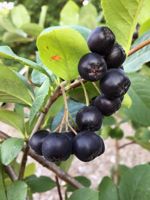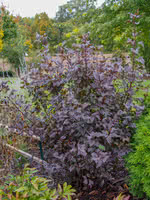Mon-Fri 9am - 5pm Mountain time
Aronia Berry vs Diablo Ninebark
Aronia melanocarpa
Physocarpus opulifolius Diablo
NOT AVAILABLE THIS SEASON - MIGHT RETURN
Aronia Berry produces black fruit that is often considered too astringent. This is why they are also referred to as Black Chokeberry. It is native to Eastern Canada and the Eastern United States. White to pink flowers appear in the spring which provides a nice contrast to the dark green foliage. In fall the leaves turn a vibrant orange to red.
It has a fast growth rate, strong roots, and can tolerate growing in wet soils. This makes it well suited for various projects including forming hedges, bank stabilization, erosion control, and in wetter riparian areas. They are also well suited as an understory plant as it grows well under other trees.
Aronia berries have their own unique flavour. The polyphenols and anthocyanins are touted as healthy antioxidants and lots of research seems to be underway on the health benefits of this fruit.
Diablo Ninebark is a small, low maintenance, multi-stemmed shrub, that is used to add texture or color to any yard. This plant grows dark purple leaves in the spring and grows slightly faster than Common Ninebark. It features flaky red to brown bark, clusters of white flowers, and long, maple-like leaves. Diablo Ninebark can make a dense and colorful hedge, or it can be an attractive ornamental by itself.

